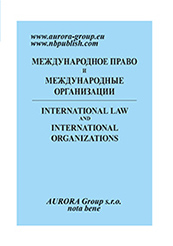INTERNATIONAL ORGANIZATIONS, INTERNATIONAL LAW AND NATIONAL LAW
Reference:
Bagandova, L.Z. (2025). Planning and preparation of aggressive war as a crime: objective signs. International Law and International Organizations, 3, 1–15. https://doi.org/10.7256/2454-0633.2025.3.73165
Abstract:
The subject of this study is the objective signs of planning and preparing an aggressive war (part 1 of Article 353 of the Criminal Code of the Russian Federation). Defining the generic object of the crime under consideration, the author conducts an interdisciplinary study of the concepts of "peace" and "human security". The author emphasizes that the existing concepts of the immediate object in relation to this corpus delicti need to be supplemented. Thus, the main direct object of the crimes provided for in Part 1 of Article 353 of the Criminal Code of the Russian Federation is public relations to ensure peace and peaceful coexistence of states and peoples. Separately, the author examines the planning and preparation of an aggressive war and clarifies their content. The article raises a controversial issue about the qualification of the actions of sabotage and reconnaissance groups: the author clarifies that there is a competition of actions within the framework of the article. In preparing this study, the author used formal legal, historical, comparative methods, as well as methods of induction, deduction and analysis. The author's special contribution to the present study is the illustration of his conclusions. Thus, the author actively refers to historical examples, in particular, to the facts about the Great Patriotic War, and also analyzes modern realities. An analysis of a number of objective signs of the elements of crimes fixed in Part 1 of Article 353 of the Criminal Code of the Russian Federation led to the conclusion that the content of the acts provided for by the norm is not established in normative acts, and have only doctrinal justifications. Planning and preparation for aggressive war is essentially a stage of preparation for the commission of a crime and includes the commission of such actions as the development of plans, tactical materials and meetings. Preparation for an act of aggression is an action to implement the developed plans. The author also proposed a new definition of "peace", reflecting the essence of this concept for the purposes of applying the norms of Chapter 34 of the Criminal Code of the Russian Federation.
Keywords:
criminal law, corpus delicti, Nuremberg Tribunal, security of humanity, peace, war, preparing of war, planning of war, aggressive war, aggression
INTEGRATION LAW AND SUPRANATIONAL UNIONS
Reference:
Kozlov, A.V. (2025). Change in the energy usage in EU countries: features of the implementation of the REPowerEU. International Law and International Organizations, 3, 16–27. https://doi.org/10.7256/2454-0633.2025.3.73954
Abstract:
This article examines the energy policy of the European Union and its transformation in connection with the changing geopolitical situation. It outlines key challenges faced by the energy supply of the European Union, which necessitate the creation of reliability guarantees and the enhancement of energy efficiency and energy security. The author pays special attention to analyzing the existing energy consumption market in the European Union and the problems associated with specific energy sources. The article also analyzes the features of implementing the REPowerEU program, which aims to accelerate the transition to renewable energy sources and improve energy efficiency, as well as the impact of the geopolitical situation on these processes. In preparing this study, the author used formal-legal and systemic methods, as well as methods of induction, deduction, and analysis. The author also draws conclusions about the potential impact of internal measures taken under this program on the international community. The article emphasizes the need for effective management and control over these processes, and concludes about the irreversible nature of the current energy policy of the European Union. Among the most important recommendations, the author highlights the need to normalize business relations with global powers and the necessity of a more balanced transition to renewable sources. Notably, there is a recommendation to consider the interests of both the internal member states of the European Union and the interests of neighboring partner countries during the implementation of the current energy policy, including analyzing the potential consequences of the internal measures adopted by the European Union for the global energy community.
Keywords:
green agenda, energy efficiency, Green Deal, EU energy strategy, gas supply diversification, REPowerEU program, renewable energy sources, transformation, energy security, EU energy policy
 This work is licensed under a Creative Commons Attribution-NonCommercial 4.0 International License.
This work is licensed under a Creative Commons Attribution-NonCommercial 4.0 International License.
 Eng
Eng












 © 1998 – 2025 Nota Bene. Publishing Technologies. NB-Media Ltd.
© 1998 – 2025 Nota Bene. Publishing Technologies. NB-Media Ltd.




